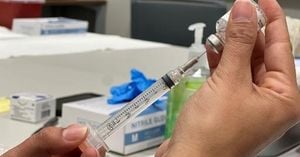Research on lithium-ion batteries is heating up, spurred by the booming electric vehicle market and the push for sustainable energy solutions. Recent findings from various studies have unveiled innovative approaches to battery management, focusing on enhancing performance, efficiency, and recycling capabilities.
The global demand for lithium-ion batteries, primarily used for powering electric vehicles (EVs), smartphones, and other electronic devices, continues to surge. This increasing reliance on batteries has prompted researchers to explore new methods for improving their longevity and environmental impact. One such study, published by Natcha Wongnaree and colleagues from Suranaree University of Technology, investigates the leaching kinetics of valuable metals from the calcined black mass derived from incinerated spent lithium-ion batteries. The findings revealed optimal leaching conditions using sulfuric acid and hydrogen peroxide, achieving impressive efficiencies of 100% for lithium, nickel, and manganese, and 97.17% for cobalt.
These advances are particularly relevant as the world faces growing shortages of rare metals, which form the backbone of lithium-ion battery technology. With the global supply chain for these metals experiencing turbulence, particularly from countries holding significant resources, researchers are recognizing the necessity of indoor recycling initiatives. The need for sustainable solutions is not just environmental; it's becoming increasingly economically pragmatic, as highlighted by the increasing regulations surrounding battery disposal and recycling, particularly within Europe.
While the recovery and recycling of battery materials are gaining traction, there are also exciting developments on the enhancement side of lithium-ion technology. A recent report by chemeurope.com detailed how researchers are exploring the use of vanadium to stabilize lithium-ion batteries. This new approach could extend the lifespan of batteries and improve their efficiency. By integrating vanadium, known for its excellent redox potential, researchers believe they can mitigate common issues faced by lithium-ion batteries such as degradation and capacity loss. This research aligns well with the growing interest within the battery industry to address issues of performance, safety, and recyclability.
At the forefront of these innovations is Marcos Lucero, a fourth-year chemical engineering doctoral student at Oregon State University. Lucero spent his summer conducting research at the Lawrence Livermore National Laboratory under the U.S. Department of Energy’s Energy Storage Internship Program. His work focused on the restoration of degraded lithium-ion batteries, showcasing the potential for extending the life of these batteries through technical advancements.
According to Lucero, "This experience not only solidified my interest in battery technology but also emphasized the importance of developing sustainable solutions to restore existing technologies rather than just focusing on new production." His studies reflect the pressing need for research geared toward the restoration and sustainability of lithium-ion batteries, especially as the market for electric vehicles expands rapidly.
Another exciting initiative is JGC Holding Corporation's recent investment in the startup tozero, which specializes in recycling lithium-ion batteries. The investment through its Mirai Corporate Venture Capital fund highlights the company’s commitment to fostering technology aimed at creating sustainable social systems through innovative recycling processes. tozero is making strides with its advanced methods of separating lithium from other materials, transforming so-called "black mass" from battery waste back to valuable battery materials. This collaborative effort may very well set the groundwork for future circular economies surrounding battery production and recycling.
By focusing on efficient recycling and recovery processes, companies like JGC are encouraging other stakeholders within the lithium-ion battery supply chain to invest similarly. The idea of reintroducing recovered materials back to the production of new batteries could significantly alter the fabric of the battery market.
Experts believe the combination of enhanced recycling processes, novel materials like vanadium, and restoring existing batteries can vastly improve the environmental footprint of lithium-ion batteries. This combination could make electric vehicles not just more sustainable but also more economically viable, reducing dependence on newly mined materials and supporting the transition toward carbon neutrality.
With the electric vehicle market projected for exponential growth, every element of lithium-ion battery usage, from the moment they’re produced to beyond their lifecycle, is under scrutiny for improvement. The focus on clean energy is driving advancements to adopt sustainable sourcing practices and recover existing materials, indicating industry stakeholders are more committed than ever to embracing change.
Overall, this multi-faceted approach to research and development could position the lithium-ion battery as not only pivotal to the green energy movement but also as financially conducive to both manufacturers and consumers. Researchers are spearheading initiatives aimed not just at producing batteries but ensuring they are managed responsibly and sustainably throughout their lifecycle.



